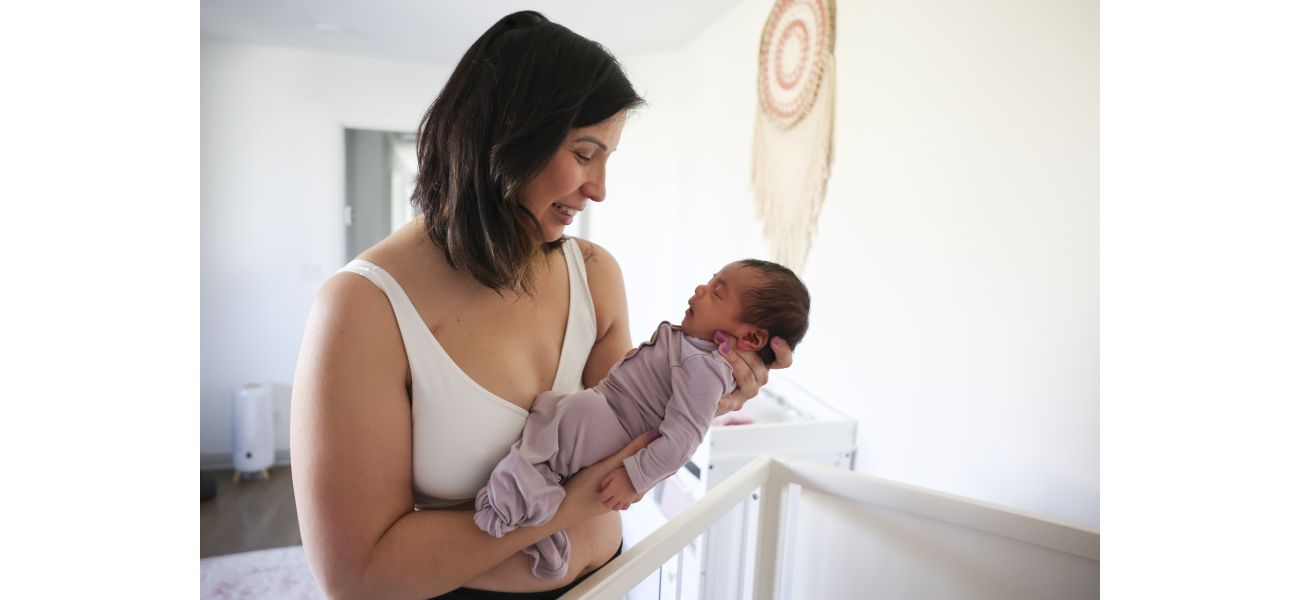UChicago scientists creating 'bionic breast' to help mastectomy patients regain sense of touch.
Heather Tubigan, a 36-year-old mother from suburban Chicago, was devastated by the news of her breast cancer diagnosis. Despite her initial instinct to remove both breasts, her surgeon advised her against it.
December 22nd 2024.

The news of her diagnosis was a devastating blow to Heather Tubigan, a young mother from suburban Chicago. At just 36 years old, she discovered a small lump in her left breast, no larger than an avocado seed. Unfortunately, the biopsy revealed that it was a cancerous tumor, and it had already spread to her lymph nodes.
Filled with fear and uncertainty, Heather's first instinct was to have both of her breasts removed. She couldn't bear the thought of having cancer in her body and wanted to get rid of it as soon as possible. However, her surgeon advised against it, explaining the benefits of keeping her healthy breast. Not only would it preserve the feeling on one side of her chest, but it would also maintain her ability to experience sensations like warmth and sexual arousal.
Heather struggled with the decision, torn between wanting to be rid of the cancer and not wanting to lose the sensation in her breast. It was a difficult concept to wrap her head around, the idea of not being able to feel anything on one side of her body. But she ultimately chose to trust her surgeon's advice and only have the affected breast removed.
However, even with the successful removal of the cancer, Heather couldn't shake the feeling of loss. She soon learned that the breast is not just a cosmetic part of the body, but it serves many important functions, including sensation and sexual pleasure. This realization prompted her to seek out a groundbreaking project at the University of Chicago that aimed to restore the sense of touch in mastectomy patients.
Led by Dr. Stacy Tessler Lindau, the team of doctors, neuroscientists, and bioengineers was working on an implantable device called the "bionic breast." This device would potentially be able to revive feeling in the breast post-mastectomy and reconstruction. For Heather, the thought of being able to feel again was both exciting and comforting.
The bionic breast project received a significant grant and was set to begin clinical trials soon. However, the sudden and unexpected death of one of the team members, Dr. Sliman Bensmaia, was a devastating setback. He had been instrumental in the development of prosthetic limbs that restored a sense of touch to patients with paralysis or amputation.
Dr. Lindau explained that while breast reconstruction can restore the appearance of the chest, it does not address the loss of sensation, which can have profound effects on a person's physical and psychological well-being. For some women, the loss of their breasts can feel like a loss of identity and femininity. It's an existential crisis that can make them question their humanity.
Despite the successful removal of the cancer, Heather still struggled with the loss of sensation in her remaining breast. She had chosen to keep it, but it was a constant reminder of what she had lost. However, she was grateful for her surgeon, Dr. Nora Jaskowiak, who had taken the time to counsel her through the decision-making process.
Dr. Jaskowiak stressed the importance of considering all aspects of breast cancer treatment, including the sense of touch in the breast. It was a factor that many patients might overlook in the midst of their fear and anxiety. The loss of sensation can have long-term effects on daily activities, such as hugging a loved one or holding a grandchild.
For Heather, the loss of touch was also affecting her ability to breastfeed her newborn daughter. She and her husband had longed for another child, but they were unsure if it was still a possibility after her cancer diagnosis. They had taken precautions by harvesting her eggs before undergoing chemotherapy and radiation therapy. However, they were overjoyed to conceive naturally, and Heather was able to breastfeed her daughter, feeling the warmth and connection between mother and child.
Dr. Lindau has dedicated her career to helping cancer patients recover their sexual function during and after treatment. She has seen firsthand how the loss of sensation in the breast can interfere with sexual pleasure and intimacy. For many women, the nipple-areolar complex plays a crucial role in their sexual experience. Losing it can lead to difficulties in achieving orgasm, which can be particularly challenging for those who have had a double mastectomy.
One of Dr. Lindau's patients asked her, "What are you going to do about this?" She was referring to the loss of sensation in the breast, and it was a question that stuck with Dr. Lindau. It was the driving force behind the bionic breast project and a testament to the determination and faith of patients like Heather, who refuse to let cancer take away their sense of touch.
When Heather Tubigan, a young mother from the suburbs of Chicago, was diagnosed with breast cancer at the age of 36, it was a devastating blow. She had discovered a small lump in her left breast, roughly the size of an avocado seed. But unfortunately, it turned out to be a malignant tumor that had already spread to her lymph nodes. Understandably, she was terrified and quickly asked her surgeon to remove both of her breasts, even though the cancer was only affecting one side.
"I just wanted to get rid of them both," Heather recalls. "When you have cancer, all you want is to be rid of it." But her surgeon urged her to reconsider. While the affected breast had to be removed, the doctor explained the many benefits of keeping the healthy breast intact. Not only would it preserve feeling on one side of her chest, but it would also help maintain a sense of wholeness and femininity after surgery.
The thought of losing all sensation in one of her breasts was difficult for Heather to comprehend. She struggled with the decision for a long time, going back and forth between keeping or removing the healthy breast. "The idea of not having my breast and not being able to feel was very hard for me to grasp," she says. "You can't wrap your head around it, the idea of having no sensation or feeling."
That's why a groundbreaking project at the University of Chicago caught Heather's attention. Led by a team of doctors, neuroscientists, and bioengineers, the project aims to restore the sense of touch in patients who have undergone a mastectomy. They are building an implantable device, dubbed the "bionic breast," which will help bring back feeling to the chest area after surgery. Dr. Stacy Tessler Lindau, the principal investigator of the project, explains that the focus of breast reconstruction has always been on appearance, rather than function. But with their work, they hope to change that and give patients a chance to regain an important aspect of their body.
The first clinical trial for the device is set to begin in early 2025, and Dr. Lindau is excited about the potential it holds. However, the project faced a setback when one of the key researchers, neuroscientist Sliman Bensmaia, unexpectedly passed away in 2023. He had been working closely with Dr. Lindau for seven years, and his research on prosthetic limbs that restored a sense of touch was the basis for the bionic breast project.
While breast reconstruction can restore the appearance of the chest, many mastectomy patients still struggle with a sense of physical and psychological loss. Dr. Lindau explains that for some women, the loss of their breasts can feel like a loss of identity and femininity. It's an existential loss that can call into question their humanity.
Heather ultimately ended up having a unilateral mastectomy in 2020, keeping her right breast. She is grateful to her surgeon, Dr. Nora Jaskowiak, for taking the time to guide her through the decision-making process and weigh the risks and benefits of different options. She is also intrigued by the bionic breast project and the possibility of regaining feeling in her left breast.
As a breast cancer survivor, Heather cherishes the ability to feel her son Ryker when she holds him close. She explains that on her right side, she can feel his warmth and touch, but on her left, she only feels pressure. Having a sense of touch in her remaining breast is incredibly comforting, especially when it comes to bonding with her children. Heather and her husband longed to have another child, and they were unsure if cancer had taken that possibility away from them. But after undergoing fertility preservation and conceiving naturally, Heather gave birth to a daughter in 2024.
Dr. Jaskowiak, Heather's surgeon, stresses that every breast cancer case is unique, and she takes the time to help patients understand their options and the long-term consequences of their decisions. She explains that the sense of touch in the breast is an important factor that patients might overlook in the midst of fear and anxiety.
"It's not just about the physical sensation," she says. "It's about the emotional and psychological impact of not having that sensation. When you hold your grandchild, you're not going to feel that child against your chest when your breast is completely numb."
Dr. Lindau has been working in the field of onco-sexuality for over 14 years, helping cancer patients recover their sexual function during and after treatment. She has found that more than half of her patients are breast cancer survivors, and she has come to appreciate the importance of the breast as a sexual organ for women. The nipple-areolar complex has a similar physiology to the penis and clitoris, and for many women, losing it can result in the inability to achieve orgasm.
One day, a patient asked Dr. Lindau what could be done about this issue. That's when she decided to partner with Dr. Bensmaia and work towards applying his technology for prosthetic limbs to restore feeling in the breast post-mastectomy. While the project faced a setback with Dr. Bensmaia's passing, Dr. Lindau is determined to continue their work and give women the chance to regain an important aspect of their bodies.
For Heather, the ability to feel her newborn daughter nursing on her right breast is a beautiful and meaningful experience. She describes it as a shared connection between her and her child, showing another sense of love that the human body is capable of. And for her, this is just one of the many rewards of having faith and hope throughout her battle with breast cancer.
Filled with fear and uncertainty, Heather's first instinct was to have both of her breasts removed. She couldn't bear the thought of having cancer in her body and wanted to get rid of it as soon as possible. However, her surgeon advised against it, explaining the benefits of keeping her healthy breast. Not only would it preserve the feeling on one side of her chest, but it would also maintain her ability to experience sensations like warmth and sexual arousal.
Heather struggled with the decision, torn between wanting to be rid of the cancer and not wanting to lose the sensation in her breast. It was a difficult concept to wrap her head around, the idea of not being able to feel anything on one side of her body. But she ultimately chose to trust her surgeon's advice and only have the affected breast removed.
However, even with the successful removal of the cancer, Heather couldn't shake the feeling of loss. She soon learned that the breast is not just a cosmetic part of the body, but it serves many important functions, including sensation and sexual pleasure. This realization prompted her to seek out a groundbreaking project at the University of Chicago that aimed to restore the sense of touch in mastectomy patients.
Led by Dr. Stacy Tessler Lindau, the team of doctors, neuroscientists, and bioengineers was working on an implantable device called the "bionic breast." This device would potentially be able to revive feeling in the breast post-mastectomy and reconstruction. For Heather, the thought of being able to feel again was both exciting and comforting.
The bionic breast project received a significant grant and was set to begin clinical trials soon. However, the sudden and unexpected death of one of the team members, Dr. Sliman Bensmaia, was a devastating setback. He had been instrumental in the development of prosthetic limbs that restored a sense of touch to patients with paralysis or amputation.
Dr. Lindau explained that while breast reconstruction can restore the appearance of the chest, it does not address the loss of sensation, which can have profound effects on a person's physical and psychological well-being. For some women, the loss of their breasts can feel like a loss of identity and femininity. It's an existential crisis that can make them question their humanity.
Despite the successful removal of the cancer, Heather still struggled with the loss of sensation in her remaining breast. She had chosen to keep it, but it was a constant reminder of what she had lost. However, she was grateful for her surgeon, Dr. Nora Jaskowiak, who had taken the time to counsel her through the decision-making process.
Dr. Jaskowiak stressed the importance of considering all aspects of breast cancer treatment, including the sense of touch in the breast. It was a factor that many patients might overlook in the midst of their fear and anxiety. The loss of sensation can have long-term effects on daily activities, such as hugging a loved one or holding a grandchild.
For Heather, the loss of touch was also affecting her ability to breastfeed her newborn daughter. She and her husband had longed for another child, but they were unsure if it was still a possibility after her cancer diagnosis. They had taken precautions by harvesting her eggs before undergoing chemotherapy and radiation therapy. However, they were overjoyed to conceive naturally, and Heather was able to breastfeed her daughter, feeling the warmth and connection between mother and child.
Dr. Lindau has dedicated her career to helping cancer patients recover their sexual function during and after treatment. She has seen firsthand how the loss of sensation in the breast can interfere with sexual pleasure and intimacy. For many women, the nipple-areolar complex plays a crucial role in their sexual experience. Losing it can lead to difficulties in achieving orgasm, which can be particularly challenging for those who have had a double mastectomy.
One of Dr. Lindau's patients asked her, "What are you going to do about this?" She was referring to the loss of sensation in the breast, and it was a question that stuck with Dr. Lindau. It was the driving force behind the bionic breast project and a testament to the determination and faith of patients like Heather, who refuse to let cancer take away their sense of touch.
When Heather Tubigan, a young mother from the suburbs of Chicago, was diagnosed with breast cancer at the age of 36, it was a devastating blow. She had discovered a small lump in her left breast, roughly the size of an avocado seed. But unfortunately, it turned out to be a malignant tumor that had already spread to her lymph nodes. Understandably, she was terrified and quickly asked her surgeon to remove both of her breasts, even though the cancer was only affecting one side.
"I just wanted to get rid of them both," Heather recalls. "When you have cancer, all you want is to be rid of it." But her surgeon urged her to reconsider. While the affected breast had to be removed, the doctor explained the many benefits of keeping the healthy breast intact. Not only would it preserve feeling on one side of her chest, but it would also help maintain a sense of wholeness and femininity after surgery.
The thought of losing all sensation in one of her breasts was difficult for Heather to comprehend. She struggled with the decision for a long time, going back and forth between keeping or removing the healthy breast. "The idea of not having my breast and not being able to feel was very hard for me to grasp," she says. "You can't wrap your head around it, the idea of having no sensation or feeling."
That's why a groundbreaking project at the University of Chicago caught Heather's attention. Led by a team of doctors, neuroscientists, and bioengineers, the project aims to restore the sense of touch in patients who have undergone a mastectomy. They are building an implantable device, dubbed the "bionic breast," which will help bring back feeling to the chest area after surgery. Dr. Stacy Tessler Lindau, the principal investigator of the project, explains that the focus of breast reconstruction has always been on appearance, rather than function. But with their work, they hope to change that and give patients a chance to regain an important aspect of their body.
The first clinical trial for the device is set to begin in early 2025, and Dr. Lindau is excited about the potential it holds. However, the project faced a setback when one of the key researchers, neuroscientist Sliman Bensmaia, unexpectedly passed away in 2023. He had been working closely with Dr. Lindau for seven years, and his research on prosthetic limbs that restored a sense of touch was the basis for the bionic breast project.
While breast reconstruction can restore the appearance of the chest, many mastectomy patients still struggle with a sense of physical and psychological loss. Dr. Lindau explains that for some women, the loss of their breasts can feel like a loss of identity and femininity. It's an existential loss that can call into question their humanity.
Heather ultimately ended up having a unilateral mastectomy in 2020, keeping her right breast. She is grateful to her surgeon, Dr. Nora Jaskowiak, for taking the time to guide her through the decision-making process and weigh the risks and benefits of different options. She is also intrigued by the bionic breast project and the possibility of regaining feeling in her left breast.
As a breast cancer survivor, Heather cherishes the ability to feel her son Ryker when she holds him close. She explains that on her right side, she can feel his warmth and touch, but on her left, she only feels pressure. Having a sense of touch in her remaining breast is incredibly comforting, especially when it comes to bonding with her children. Heather and her husband longed to have another child, and they were unsure if cancer had taken that possibility away from them. But after undergoing fertility preservation and conceiving naturally, Heather gave birth to a daughter in 2024.
Dr. Jaskowiak, Heather's surgeon, stresses that every breast cancer case is unique, and she takes the time to help patients understand their options and the long-term consequences of their decisions. She explains that the sense of touch in the breast is an important factor that patients might overlook in the midst of fear and anxiety.
"It's not just about the physical sensation," she says. "It's about the emotional and psychological impact of not having that sensation. When you hold your grandchild, you're not going to feel that child against your chest when your breast is completely numb."
Dr. Lindau has been working in the field of onco-sexuality for over 14 years, helping cancer patients recover their sexual function during and after treatment. She has found that more than half of her patients are breast cancer survivors, and she has come to appreciate the importance of the breast as a sexual organ for women. The nipple-areolar complex has a similar physiology to the penis and clitoris, and for many women, losing it can result in the inability to achieve orgasm.
One day, a patient asked Dr. Lindau what could be done about this issue. That's when she decided to partner with Dr. Bensmaia and work towards applying his technology for prosthetic limbs to restore feeling in the breast post-mastectomy. While the project faced a setback with Dr. Bensmaia's passing, Dr. Lindau is determined to continue their work and give women the chance to regain an important aspect of their bodies.
For Heather, the ability to feel her newborn daughter nursing on her right breast is a beautiful and meaningful experience. She describes it as a shared connection between her and her child, showing another sense of love that the human body is capable of. And for her, this is just one of the many rewards of having faith and hope throughout her battle with breast cancer.
[This article has been trending online recently and has been generated with AI. Your feed is customized.]
[Generative AI is experimental.]
0
0
Submit Comment





